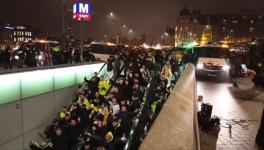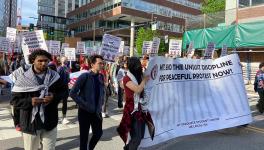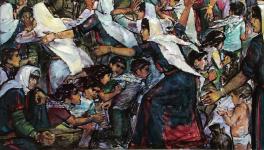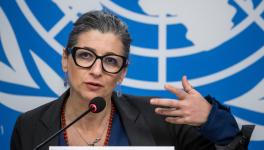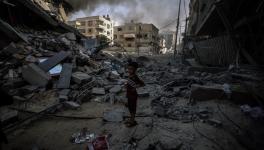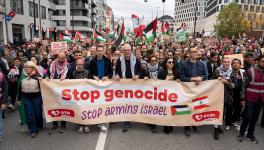Why Israel is Now a Full-fledged Apartheid State

By passing the “Jewish Nation-State law” through parliament last week, Israel – whose practices in occupied Palestine have already been widely recognized to have characteristics of apartheid – has officially endorsed apartheid.
After declaring Israel as the “historic homeland of the Jewish people”, the Basic Law – which will override any other legislated law that is contradictory – makes it clear that only the Jewish people have the “right of national self-determination” in the country, constitutionally disempowering 1.5 million Israeli citizens of Palestinian origin, amounting to 20% of the country’s population, from claims over nationality.
The law further declares Hebrew as the official language, and emphasizes the “national value of development of Jewish settlement” and mandates state policies that “encourage and promote its establishment and consolidation.”
The Israeli state, since its creation in 1948, has consciously implemented discriminatory policies in order to ensure demographic and political domination of the Jewish population over the Arabs – i.e those Palestinians people who had stayed back in their homeland after the state of Israel was created over it.
Such policies, however, were and are in contradiction with the Israeli declaration of independence, which declared that the state of Israel “will ensure complete equality of social and political rights to all its inhabitants irrespective of religion, race or gender”. But after the nation-state law that Israeli parliament passed last week, discrimination against Arab citizens of the state is now a constitutionally mandated state policy.
Such discrimination is a violation of the Universal Declaration of Human Rights which prohibits the denial of the listed rights on the grounds of “race, colour, sex, language, religion, political or other opinion, national or social origin, property, birth or other status.” Israel, which has ratified the declaration, has been consistently violating it. However, the state has been fiercely denying the accusation of apartheid.
What is Apartheid as per international law?
The argument that what Israel is practicing is not apartheid because it is not discriminating based on skin color, unlike say, South Africa, is easily disproved by the broad definition of race used in the the first international law prohibiting apartheid – the ‘International Convention on the Elimination of All Forms of Racial Discrimination’ – effective since 1969.
The word ‘race’ has been used at different periods in history to imply nationality, religion, ethnicity and skin color. The first article of the convention begins by defining “racial discrimination” as “any distinction, exclusion, restriction or preference based on race, color, descent, or national or ethnic origin which has the purpose or effect of nullifying or impairing the recognition, enjoyment or exercise, on an equal footing, of human rights and fundamental freedoms in the political, economic, social, cultural or any other field of public life.”
Violating this right, Israel’s nation-state law constitutionally denies nationality to its Arab citizens by declaring that the “right to national self-determination” in Israel is exclusive to the the Jewish people – i.e those born to a Jewish mother. While denying the right to those Palestinians historically residing in what is now Israel, the law extends the claim to nationality to even those Jews who have never resided in Israel.
Also mandated by the convention is the “right to freedom of movement and residence within the border of the State”. While a clause in the original draft of the nation-state law which proposed segregation of the Arabic citizens was removed, it was replaced by a clause which reads: “The state places national value on development of Jewish settlement and will act to encourage and promote its establishment and consolidation”. This effectively ensures that the state can constitutionally restrict the freedom of movement and residence of Arabic citizens, and allow for segregation to be practiced as a matter of state-policy.
Also violated by this clause of the nation-state law promoting establishment of “Jewish settlements” is the right of non-Jewish citizens “to own property alone, as well as in association with others”, the “right to inherit” and the “right of access to any place or service intended for use by the general public, such as transport hotels, restaurants, cafes, theaters and parks” – all of which are guaranteed by Article 5 of the convention on elimination of racial discrimination.
“The right to equal participation in cultural activities” is also denied to Palestinian citizens of the state by declaring nationality as a unique right of the Jewish people, by declaring Hebrew as the official language of the state, and the Hebrew calendar as its official calendar.
In order to put in place stricter measures against apartheid, the UN general assembly – after passing a number of resolutions condemning the policies or practices of apartheid as a “crime against humanity” – adopted in 1979 the “International Convention on the Suppression and Punishment of the Crime of Apartheid”, in order to “make it possible to take more effective measures at the international and national levels”.
Known popularly as the apartheid convention, this international criminal law declares apartheid a “Crime against Humanity”, which, along with other laws, including the Rome Statute, allows the International Court of Justice to regard “the prohibition of racial discrimination a norm of jus cogens” – i.e those norms of international law that cannot be set aside – even if Israel and South Africa, along with the US, UK and many western states, have refused to be party to the convention, argued legal experts John Dugard and John Reynolds in a paper published in The European Journal of International Law.
Article 2 of the convention elaborates on what constitutes apartheid in greater detail than the earlier convention on the elimination of discrimination. Among the numerous acts regarded as apartheid in the convention are “any legislative measures .. calculated to prevent a racial group or groups from participation in the political, social, economic and cultural life of the country and the deliberate creation of conditions preventing the full development of such a group or groups, in particular by denying to members of a racial group or groups basic human rights and freedoms”, which includes, among others, the “right to nationality” and the “right to freedom of movement and residence” – both of which Israel is denying to its Arab citizens through the new law.
It is to be noted that in reading the apartheid convention, the term ‘racial group’ should not be understood to be a reference limited to groups classified on skin colour, even though it was primarily formulated to target apartheid South Africa. As in case of the previous convention, which the apartheid convention was meant to complement and strengthen, racial groups can include nationalities, ethnicities or those groups classified according to religion, depending on the circumstances under which such identities are created.
According to a 2012 submission to the UN Committee on the Elimination of Racial Discrimination by the Russell Tribunal on Palestine:
“The situation in Israel/Palestine is not defined in terms of traditional conceptions of ‘race’ as it was in apartheid South Africa. On the basis of expert evidence heard during the Cape Town session, the Tribunal concluded that international law.. gives a broad meaning to the term ‘racial’ as including elements of ethnic and national origin, and therefore that the definition of ‘racial group’ is a sociological rather than biological one. Perceptions.. of Israeli Jewish identity and Palestinian identity illustrate that Israeli Jews and Palestinian Arabs can readily be defined as distinct racial groups for the purposes of the prohibition of apartheid under international law. From the evidence received, it was clear to the jury that two distinct, identifiable groups exist in a very practical sense and that the legal definition of ‘racial group’ applies to all circumstances in which the Israeli authorities have jurisdiction over Palestinians.”
The ‘perception’ in the above extract includes both self-perceptions created by sociological circumstances and those imposed as a matter of state policy.
“Under Israeli law and policy, group membership is an official category imposed and monitored by the state, not simply a voluntary identity. Israeli Jews are a group unified by law, sharing the same legal status wherever they reside, while Palestinian Arabs are a separate group, sub-divided into citizens, occupied residents (whose residence rights may be lost if they leave the territory in which they live), and refugees who do not have the right to return to any part of historic Palestine. No such restrictions apply to Jews: in fact, those who are not citizens already can acquire Israeli citizenship automatically by relocating to Israel or the occupied Palestinian Territory,” the tribunal’s submission stated.
Also regarded as apartheid in Article 2 of convention are “legislative measures, designed to divide the population along racial lines by the creation of separate reserves and ghettos for the members of a racial group or groups.. the expropriation of landed property belonging to a racial group or groups or to members thereof” – a clause that reads like a precise description of what the Israeli state is seeking to achieve by promoting the development and establishment of Jewish settlements as a matter of constitutionally mandated state policy.
Israel has been an apartheid state since its inception
It is not the case that prior to the passing of Jewish nation-state law last Thursday, Israel was not an apartheid state, adhering to international law. The passing of the Jewish nation-state law only implies that Israeli state’s practice of apartheid now has a constitutional mandate. However, since its inception, Israel had consistently sought to ensure the marginalization and segregation of those Arab-Palestinians who had continued to remain in their homeland.
In 1976, for instance, over 5,000 acres of land owned by Palestinian citizens in the Galilee region of northern Israel was confiscated in order to bring about a demographic change in the region from a Palestinian majority to a Jewish majority – a fact openly admitted by the state’s agricultural ministry.
Through such policies and other measures, including those using the military, the state has ensured that 93% of the land is exclusively reserved for the Jews. The Palestinians, on the other hand, “live in crowded spaces, often unable and unauthorized to refurbish or construct houses, living in villages that are sometimes not even officially recognized”, the Russell Tribunal’s submission stated, adding:
“The landscape of the West Bank is dominated by exclusively Israeli-Jewish settlements and their associated regime of separate roads, closed military zones, checkpoints and the Wall which interrupt the contiguity of the territory, and ensure that Palestinian communities are confined to isolated enclaves. Israeli settlers enjoy the protection of the authorities and military, with their own laws and preferential access to scarce resources such as water, to the detriment of the Palestinian population. Palestinians are prohibited from entering settlements (unless with special permission, such as for workers), military zones and ‘natural reserves’, meaning that almost half of the West Bank territory is closed to its Palestinian population.”
Even the roads connecting these are reserved exclusively reserved for Jews. Through a permit system, access of Palestinians to farmland is tightly controlled. They are also prohibited from entering beaches on Palestine’s shore along the Dead Sea.
The apartheid convention also identifies as the practice of apartheid the systematic subjection of a ‘racial group’ to murder and extra-judicial killings.The systematic and state-sanctioned use of sniper fire to kill hundreds Palestinian protesters in the course of the Great Return March this year is a recent example of the same. Another example would be the military operations in 2014 – involving airstrikes and ground bombardment of Gaza – which killed 1,462 Palestinian civilians, 495 of whom were children.
Another policy identified as practice of apartheid in the convention is the “arbitrary arrest and illegal imprisonment of the members of a racial group”. As on 2016, a total of 7,000 Palestinians were arbitrarily detained in Israeli jails, with 10% of them held under “administrative detention”, which allows the state to hold victims in detention for indefinite periods without filing any charges, based on ‘secret evidence’ not made available to the detained prisoners or their lawyers.
On an average, 912 Palestinian children between the age of 12-17 are arrested by Israeli military in the occupied areas. In the course of their interrogation, many of these children are reportedly “struck with the back of a gun; struck on the head with a torch; beaten with a baton; sat on; kicked; slapped; shot with a rubber bullet while on the ground; stepped on causing a fractured arm; punched; pushed off a bike; pushed into furniture; twisting a broken arm; pushed into a wall and barbed wire; handcuffs deliberately tightened; holding a stress position; and kicked in the genitals.”
According to the apartheid convention, systematically subjecting a racial group to “infliction.. of serious bodily or mental harm.. infringement of their freedom or dignity, or by subjecting them to torture or to cruel, inhuman or degrading treatment or punishment”, qualifies as an apartheid practice.
Also identified as apartheid in the convention is the “deliberate imposition on a racial group or groups of living conditions calculated to cause its or their physical destruction in whole or in part.” Since 2014, 3,861 Palestinians, including 1,960 children, have been forcibly displaced in the occupied territories. Livelihoods and access to almost 20,000 Palestinians have been seriously adversely impacted. In 2016 alone, 1,054 homes and other structures essential for livelihoods were destroyed by the occupying force. WHO had previously expressed concern about lack of medicines in Gaza due the blockade imposed by Israel.
“Persecution of organizations and persons, by depriving them of fundamental rights and freedoms, because they oppose apartheid” is another act identified in the apartheid convention. Israel not only suppresses protesters in the occupied territories who rise up against the state-sanctioned discrimination, but also shuts down human rights organizations, imposes bans and subjects human rights activists to arbitrary detention. The recent spate of attacks on the BDS movement is only one example.
In his final report as the UN special rapporteur, Richard Falk, after the describing the systematic practices of Israeli state that qualify as apartheid, wrote, “It is this general structure of apartheid that exists in the Occupied Palestinian Territories that makes the allegation increasingly credible despite the differences between specific characteristics of South African apartheid and that of Occupied Palestinian Territories’ regime.”
UN Diplomat Rima Khalaf also described in her 2017 report the nature of Israel’s apartheid state. According to a press release by UN Economic and Social Commission for Western Asia, Khalaf had argued in the report that:
“Israel, encouraged by the international community’s disregard for its continual violations of international law, has succeeded over the past decades in imposing and maintaining an apartheid regime that works on two levels. First, the political and geographic fragmentation of the Palestinian people which enfeebles their capacity for resistance and makes it almost impossible for them to change the reality on the ground. Secondly, the oppression of all Palestinians through an array of laws, policies and practices that ensure domination of them by a racial group and serve to maintain the regime.”
After the UN – under pressure from the US – forced her to withdraw the report, Khalaf tendered her resignation. A number of other reports have likewise demonstrated that Israel has always been an apartheid state.
However, by pointing this out, one qualifies as an anti-semite, according to the International Holocaust Remembrance Alliance’s full-definition of Anti-semitism, which insists “claiming that the existence of a state of Israel is a racist endeavor” is an example of anti-semitism. The next example given is “Applying double standards by requiring of it a behavior not expected or demanded of any other democratic nation.”
Get the latest reports & analysis with people's perspective on Protests, movements & deep analytical videos, discussions of the current affairs in your Telegram app. Subscribe to NewsClick's Telegram channel & get Real-Time updates on stories, as they get published on our website.










